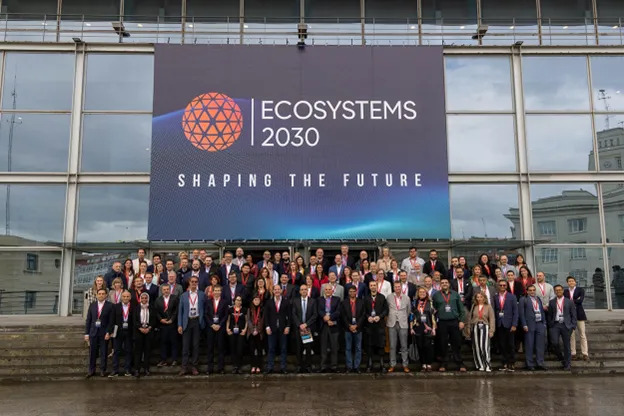Have the Aliens Arrived? Reflections from Ecosystems 2030

I was invited to speak at ES2030 in La Coruna. A beautiful province of Galicia (Spain) with a population of less than 250,000 seemed the least likely place to discuss AI, Robotics, Space Travel and what the future looked like. After my speech on the first day, where I spoke about The Future Engineer, I wanted to spend my time educating myself by listening to some of the best thinkers across domains. Unsurprisingly, there was no discussion without Generative AI and no one wanted to miss the AI Train!
I had just listened to the Head of Innovation at Microsoft, sharing the potential of Generative AI and then walked into a tapas cafe in La Coruna. In the cafe, bespectacled old men were staring into each other’s eyes and speaking with intention, hands waving while clutching a bottle of the local beer, Estella Galicia. Old women were reading newspapers and the younger ones were solving the daily crossword. Some of the customers promptly started dancing with the waiter when a romantic Spanish song was played. It was a rare sight to see people not staring into their devices. I longed for a time where life was slow and people took time to chat and debate, explore and wonder. I fear not for my generation but for what we are leaving for the next.
The tech executives in suits take pride in promoting the idea of how technology like AI is good for the world and how growth will be inclusive, even though data shows that powerful tech tools will make the best people even better but leave the majority behind. The truth is, growth is not inclusive even when we tout it to be. It will never be, so long as profit moves in only one direction — upwards. We are seeing the playbook of social media playing out all over again. Everyone was sold the idea that the mission was ‘connecting the world’, making it sound almost altruistic because it was free, and then we realized that when something is free, people become the product! Within a decade, we have got an entire generation addicted to a powerful device with even more addictive apps, leading to lower attention spans and skyrocketing mental health issues. Our children are more isolated in a connected world and their interpersonal skills are at an all-time low.
The problem is: the genie is out of the bottle, and we cannot put it back (not when AI is forecasted to create a market of $15.7 trillion by 2030!). Italy was the first to ban ChatGPT and has reversed the ban — banning anything is never the solution. Another campaign is already underway to get enough people to sign to pause Giant AI Experiments. Geoffrey Hinton (Godfather of AI) is quite worried about the dangers of AI. He thinks the aliens have landed and we haven’t noticed it because it speaks English! Everyone seems to have an opinion, but no one is sure. Will we have the ingenuity to stop before it is too late, the humility to understand that a powerful tool will eventually land up with bad actors and that human stupidity is infinite?
We should never forget that Generative AI is fundamentally more about economics than about enhancing human capabilities (OpenAI went from a nonprofit to a 30 billion market cap company effectively controlled by Microsoft!). Faster answers and a lower attention span are no longer the unintended consequences of technology — we now know this from the get-go. From year 2000 to now, our attention spans have gone down from 12 to 8 seconds (goldfish: 9 seconds). If we beat the hummingbird (3 seconds), we can say goodbye to civilization! Tech has changed human behavior in unimaginable ways. Once AI becomes more intelligent than human beings, it will control us because it will know how to program and get around the restrictions we put in place!
Progress at high speed is not compatible with nature. For decades we knew the effects of climate change and now we have reached a point of no return. We often forget that the good and the bad both increase (The Compound Effect) over time. Are we leaving our children a better world or a worse one? Hubris has no limits but when you see your child suffer is when you realize no action is without its consequence.
So, what can we do? It simply boils down to listening to that voice in your head that says, if something is wrong then we should not participate in it. And if we get enough people to do the right things, we can stop a disaster. We have done it before. A nuclear bomb has not gone off since Hiroshima and Nagasaki! Vint Cerf reminded me, gravity is the weakest force but with enough mass, it can hold a planet in its orbit. So, if there are enough people doing the right things, we can still leave our children a better world than what we inhabited.
One of my personal highlights of ES2030 was the mesmerizing opening performance by Abraham Cupeiro. Cupeiro is a skillful instrument builder and multi-instrumentalist, mostly known for bringing back long-lost instruments. I fear for the artist when AI-generated art and music leaves the real artist behind. The late journalist and culture evangelist Scott Timberg in his new book Boom Times for the End of the World has warned us of the demise of the creative class because of technology.
I am inherently an optimistic person and see the huge positives of AI (especially in medicine). But I have come to realize that it is much better to predict a dystopian world and avoid it, than predict a utopian world and be proven wrong!
At this turning point in history, as my friend and founder of ES2030, Omar Hatamleh, says, “May the conscientiousness of our better nature and the consciousness of our better interest prevail.”
(Disclaimer: The ideas, views and opinions expressed in my medium posts represent my own views and not those of any of my current or previous employer or organizations I am associated with. Also, any and all comments on my posts from respondents/commenters to my postings belong to, and only to, the responder posting the comments)

